新版PEP英语五年级下册教案
- 格式:doc
- 大小:30.50 KB
- 文档页数:14
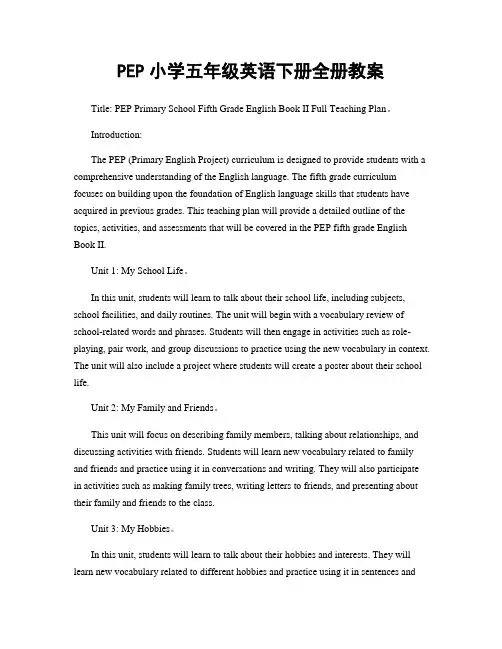
PEP小学五年级英语下册全册教案Title: PEP Primary School Fifth Grade English Book II Full Teaching Plan。
Introduction:The PEP (Primary English Project) curriculum is designed to provide students with a comprehensive understanding of the English language. The fifth grade curriculum focuses on building upon the foundation of English language skills that students have acquired in previous grades. This teaching plan will provide a detailed outline of the topics, activities, and assessments that will be covered in the PEP fifth grade English Book II.Unit 1: My School Life。
In this unit, students will learn to talk about their school life, including subjects, school facilities, and daily routines. The unit will begin with a vocabulary review of school-related words and phrases. Students will then engage in activities such as role-playing, pair work, and group discussions to practice using the new vocabulary in context. The unit will also include a project where students will create a poster about their school life.Unit 2: My Family and Friends。
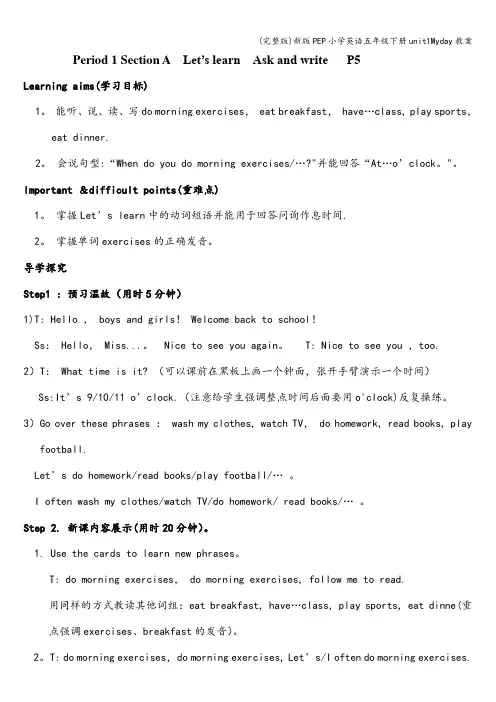
Period 1 Section A Let’s learn Ask and write P5Learning aims(学习目标)1。
能听、说、读、写do morning exercises, eat breakfast,have…class, play sports,eat dinner.2。
会说句型:“When do you do morning exercises/…?"并能回答“At…o’clock。
"。
Important &difficult points(重难点)1。
掌握Let’s learn中的动词短语并能用于回答问询作息时间.2。
掌握单词exercises的正确发音。
导学探究Step1 : 预习温故(用时5分钟)1)T: Hello , boys and girls! Welcome back to school!Ss: Hello, Miss...。
Nice to see you again。
T: Nice to see you ,too.2)T: What time is it? (可以课前在黑板上画一个钟面,张开手臂演示一个时间)Ss:It’s 9/10/11 o’clock.(注意给学生强调整点时间后面要用o'clock)反复操练。
3)Go over these phrases : wash my clothes, watch TV, do homework, read books, play football.Let’s do homework/read books/play football/… 。
I often wash my clothes/watch TV/do homework/ read books/… 。
Step 2. 新课内容展示(用时20分钟)。
1. Use the cards to learn new phrases。
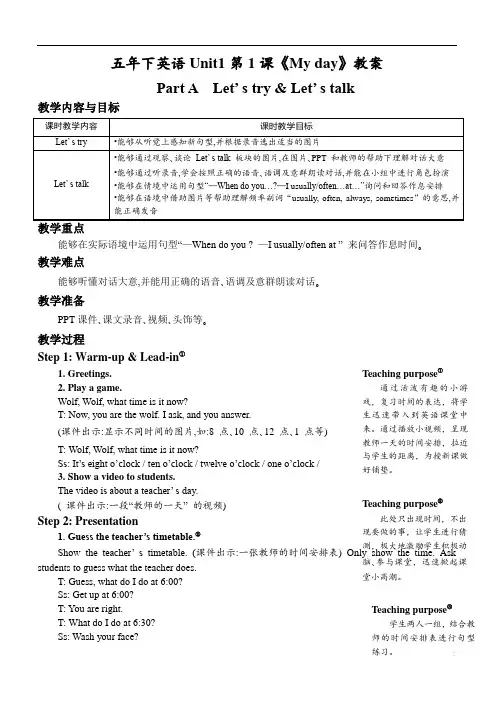
3五年下英语Unit1第1课《My day 》教案Part A Let’ s try & Let’ s talk教学内容与目标教学重点能够在实际语境中运用句型“—When do you ? —I usually/often at ” 来问答作息时间。教学难点能够听懂对话大意,并能用正确的语音、语调及意群朗读对话。教学准备PPT 课件、课文录音、视频、头饰等。教学过程Step 1: Warm-up & Lead-in ①1. Greetings.2. Play a game.Wolf, Wolf, what time is it now?T: Now, you are the wolf. I ask, and you answer.(课件出示:显示不同时间的图片,如:8 点、10 点、12 点、1 点等) T: Wolf, Wolf, what time is it now?Ss: It’s eight o’clock / ten o’clock / twelve o’clock / one o’clock / 3. Show a video to students.The video is about a teacher’ s day.( 课件出示:一段“教师的一天” 的视频)Step 2: Presentation1. Guess the teacher’s timetable.②Show the teacher’ s timetable. (课件出示:一张教师的时间安排表) Only show the time. Askstudents to guess what the teacher does.T: Guess, what do I do at 6:00?Ss: Get up at 6:00? T: You are right. T: What do I do at 6:30? Ss: Wash your face? Teaching purpose ①通过活泼有趣的小游戏,复习时间的表达,将学生迅速带入到英语课堂中来。
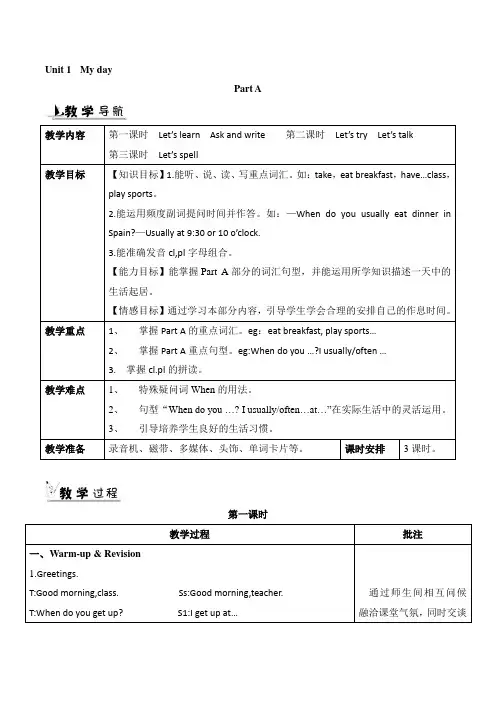
Unit 1 My dayPart A教学内容第一课时Let’s learn Ask and write 第二课时Let’s try Let’s talk第三课时Let’s spell教学目标【知识目标】1.能听、说、读、写重点词汇。
如:take,eat breakfast,have…class,play sports。
2.能运用频度副词提问时间并作答。
如:—When do you usually eat dinner inSpain?—Usually at 9:30 or 10 o’clock.3.能准确发音cl,pl字母组合。
【能力目标】能掌握Part A部分的词汇句型,并能运用所学知识描述一天中的生活起居。
【情感目标】通过学习本部分内容,引导学生学会合理的安排自己的作息时间。
教学重点1、掌握Part A的重点词汇。
eg:eat breakfast, play sports…2、掌握Part A重点句型。
eg:When do you …?I usually/often …3. 掌握cl.pl的拼读。
教学难点1、特殊疑问词When的用法。
2、句型“When do you …? I usually/often…at…”在实际生活中的灵活运用。
3、引导培养学生良好的生活习惯。
教学准备录音机、磁带、多媒体、头饰、单词卡片等。
课时安排3课时。
第一课时教学过程批注一、Warm-up & Revision1.Greetings.T:Good morning,class. Ss:Good morning,teacher.T:When do you get up? S1:I get up at…通过师生间相互问候融洽课堂气氛,同时交谈第二课时第三课时7.学生根据发音规律反复自读。
教师台下个别指导。
8.Activity.教师出示单词卡片,学生迅速准确的将该单词大声的读两遍,多读或读错的同学将受到惩罚。
9.听录音,跟读一遍。

新人教版(PEP)五年级下册英语全册教案Unit 1 My Day单元教学目标类别教学目标知识与能力目标1.能够听、说、读、写A、B部分中Let’s talk和Let’s learn的重点句子和单词。
2.掌握A部分Let’s spell中所给单词的字母组合的发音规律以及音标,并能熟读这些单词。
3.理解B部分Read and write中的短文,并能根据短文内容完成题目,回答问题。
4.理解B部分Let’s check和Let’s wrap it up中的题目内容,并能正确地答题。
情感态度、文化意识、学习策略目标1.能够在生活中主动询问别人或对别人的询问能热情应答,相互了解各自的日常学习及生活情况。
2.能够了解学校中及社会生活中相关活动的名称,激发学生热爱学习、热爱生活的美好情感。
3.能够合理地安排日常学习和周末活动。
单元课时分配第1课时A部分Let’s try Let’s talk第2课时A部分Let’s learn Ask and write第3课时A部分Let’s spell第4课时B部分Let’s try Let’s talk第5课时B部分Let’s learn Do a survey第6课时B部分Read and write Let’s check Let’s wrap it up C部分Story time课时第一课时教学重难点1. 掌握重点句型When do you…及回答。
2. 理解句子When do you finish class in the morning?的相关语法点。
教学准备1.课本录音2.多媒体课件Ⅰ.Warm-up (Revision) 备注教师带领学生复习上一学期中与本课时相关的情景对话。
Ⅱ.Presentation教学步骤Let’s try1.在听Let’s try部分的录音之前,教师告诉学生题目要求。
2.教师按课本上三张图片的顺序进行提问:What is it in the first/second/thirdpicture?(学生的回答只要大概符合图片内容即可)3.学生审题完毕后,教师播放录音,学生注意听对话所描述的图片,完成听力题目,教师核对答案,并对该听力题目进行讲解。
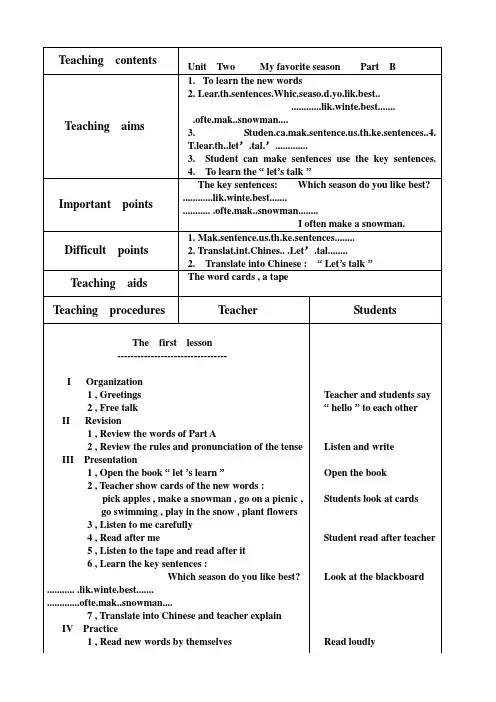
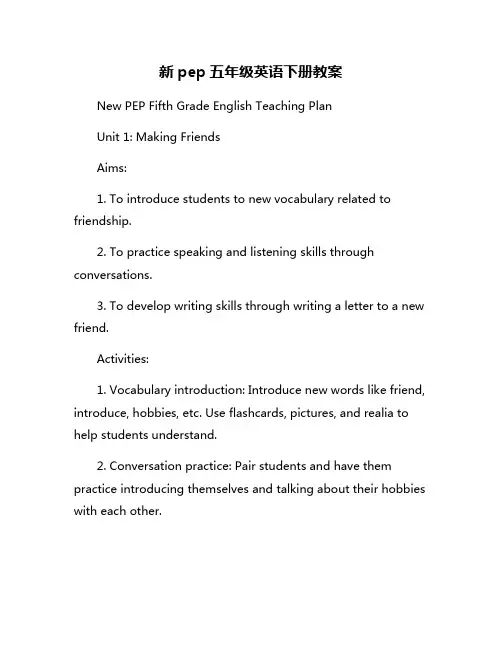
新pep五年级英语下册教案New PEP Fifth Grade English Teaching PlanUnit 1: Making FriendsAims:1. To introduce students to new vocabulary related to friendship.2. To practice speaking and listening skills through conversations.3. To develop writing skills through writing a letter to a new friend.Activities:1. Vocabulary introduction: Introduce new words like friend, introduce, hobbies, etc. Use flashcards, pictures, and realia to help students understand.2. Conversation practice: Pair students and have them practice introducing themselves and talking about their hobbies with each other.3. Writing activity: Have students write a letter to a new friend, introducing themselves and their hobbies. Encourage them to use the new vocabulary learned.Unit 2: My FamilyAims:1. To introduce students to vocabulary related to family members.2. To practice speaking and listening skills through describing family members.3. To develop writing skills through writing a family tree.Activities:1. Vocabulary introduction: Introduce new words like mother, father, sister, brother, etc. Use flashcards and pictures to help students learn the words.2. Speaking practice: Have students describe their family members to a partner, using the new vocabulary learned.3. Writing activity: Have students draw and write about their family tree. Encourage them to use the new vocabulary and describe each family member.Unit 3: My SchoolAims:1. To introduce students to vocabulary related to school subjects and facilities.2. To practice speaking and listening skills through talking about school.3. To develop writing skills through writing about a typical school day.Activities:1. Vocabulary introduction: Introduce new words like math, science, playground, etc. Use flashcards and pictures to help students understand.2. Speaking practice: Have students talk about their favorite school subjects and describe the school facilities they like the most.3. Writing activity: Have students write about a typical school day, describing their schedule, school subjects, and activities they do at school.Unit 4: My HobbiesAims:1. To introduce students to vocabulary related to hobbies and activities.2. To practice speaking and listening skills through talking about hobbies.3. To develop writing skills through writing a short paragraph about their favorite hobby.Activities:1. Vocabulary introduction: Introduce new words like hobby, gardening, swimming, etc. Use flashcards and pictures to help students learn the words.2. Speaking practice: Have students talk about their hobbies and why they enjoy them. Encourage them to ask questions to their peers about their hobbies.3. Writing activity: Have students write a short paragraph about their favorite hobby, describing what they do and why they enjoy it.Unit 5: My CommunityAims:1. To introduce students to vocabulary related to community places and people.2. To practice speaking and listening skills through talking about their community.3. To develop writing skills through writing about a community event or activity.Activities:1. Vocabulary introduction: Introduce new words like library, park, police station, etc. Use flashcards and pictures to help students understand.2. Speaking practice: Have students talk about their community, describing their favorite places and people in the neighborhood.3. Writing activity: Have students write about a community event or activity they recently attended, describing what happened and why they enjoyed it.Overall, this teaching plan aims to help students improve their English language skills through a variety of activities and exercises that focus on vocabulary acquisition, speaking and listening practice, and writing tasks. By engaging students in meaningful and interactive activities, teachers can create adynamic and fun learning environment that promotes language acquisition and retention.。
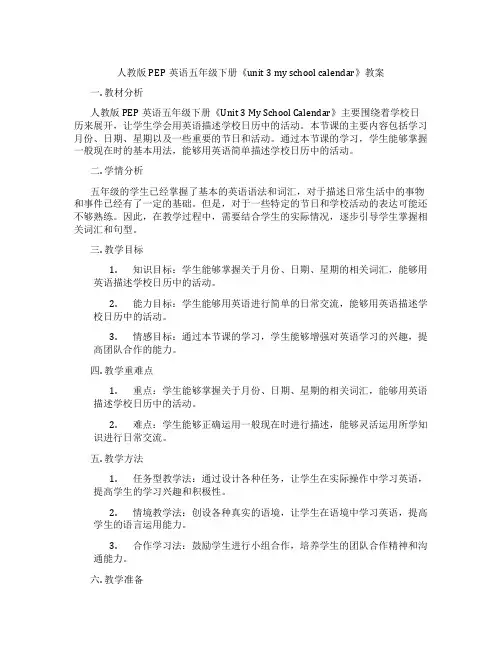
人教版PEP英语五年级下册《unit 3 my school calendar》教案一. 教材分析人教版PEP英语五年级下册《Unit 3 My School Calendar》主要围绕着学校日历来展开,让学生学会用英语描述学校日历中的活动。
本节课的主要内容包括学习月份、日期、星期以及一些重要的节日和活动。
通过本节课的学习,学生能够掌握一般现在时的基本用法,能够用英语简单描述学校日历中的活动。
二. 学情分析五年级的学生已经掌握了基本的英语语法和词汇,对于描述日常生活中的事物和事件已经有了一定的基础。
但是,对于一些特定的节日和学校活动的表达可能还不够熟练。
因此,在教学过程中,需要结合学生的实际情况,逐步引导学生掌握相关词汇和句型。
三. 教学目标1.知识目标:学生能够掌握关于月份、日期、星期的相关词汇,能够用英语描述学校日历中的活动。
2.能力目标:学生能够用英语进行简单的日常交流,能够用英语描述学校日历中的活动。
3.情感目标:通过本节课的学习,学生能够增强对英语学习的兴趣,提高团队合作的能力。
四. 教学重难点1.重点:学生能够掌握关于月份、日期、星期的相关词汇,能够用英语描述学校日历中的活动。
2.难点:学生能够正确运用一般现在时进行描述,能够灵活运用所学知识进行日常交流。
五. 教学方法1.任务型教学法:通过设计各种任务,让学生在实际操作中学习英语,提高学生的学习兴趣和积极性。
2.情境教学法:创设各种真实的语境,让学生在语境中学习英语,提高学生的语言运用能力。
3.合作学习法:鼓励学生进行小组合作,培养学生的团队合作精神和沟通能力。
六. 教学准备1.教师准备:准备好相关的教学材料,如PPT、学校日历、活动图片等。
2.学生准备:学生提前预习本节课的内容,了解一些基本的节日和学校活动。
七. 教学过程1.导入(5分钟)教师通过提问方式引导学生谈论日常生活中的活动,如:“What do you usually do on weekends?”,从而引出本节课的主题——学校日历。
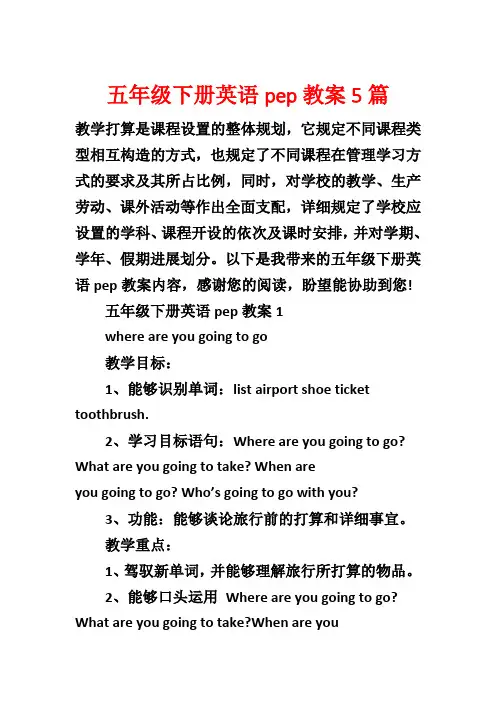
五年级下册英语pep教案5篇教学打算是课程设置的整体规划,它规定不同课程类型相互构造的方式,也规定了不同课程在管理学习方式的要求及其所占比例,同时,对学校的教学、生产劳动、课外活动等作出全面支配,详细规定了学校应设置的学科、课程开设的依次及课时安排,并对学期、学年、假期进展划分。
以下是我带来的五年级下册英语pep教案内容,感谢您的阅读,盼望能协助到您!五年级下册英语pep教案1where are you going to go教学目标:1、能够识别单词:list airport shoe ticket toothbrush.2、学习目标语句:Where are you going to go? What are you going to take? When areyou going to go? Who’s going to go with you?3、功能:能够谈论旅行前的打算和详细事宜。
教学重点:1、驾驭新单词,并能够理解旅行所打算的物品。
2、能够口头运用Where are you going to go? What are you going to take?When are yougoing to go to the airport?Who’s going to go to the airport?这类问句就详细信息提问。
教学难点:能够和同学用“where、what、when、who”这四个单词开头的疑问句谈论旅行前的准备。
教学用具:录音机、PPT教学过程:Step1、Warm-up师生之间相互问候Step2、Presentation Free talkT:the summer holiday is coming ,so Where are you going to go in yoursummerholidays? When are you going to go there? What are you going to take? Whatare you going to do there? Who is going to go with you ? (生逐一答复后,师总结):I thinkyou had a lovely time, Yes? 由此活动引出Where, When, What, Who?等特别疑问词,并带着同学们复习一般将来时的用法。
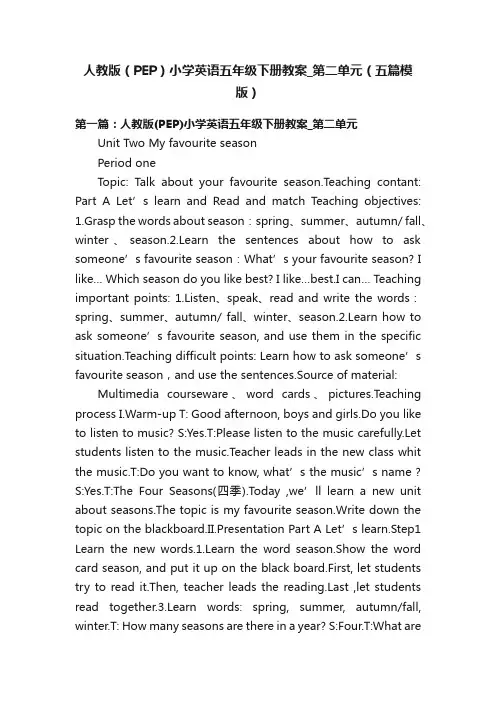
人教版(PEP)小学英语五年级下册教案_第二单元(五篇模版)第一篇:人教版(PEP)小学英语五年级下册教案_第二单元Unit Two My favourite seasonPeriod oneTopic: Talk about your favourite season.Teaching contant: Part A Let’s learn and Read and match Teaching objectives: 1.Grasp the words about season:spring、summer、autumn/ fall、winter、season.2.Learn the sentences about how to ask someone’s favourite season:What’s your favourite season? I like… Which season do you like best? I like…best.I can… Teaching important points: 1.Listen、speak、read and write the words:spring、summer、autumn/ fall、winter、season.2.Learn how to ask someone’s favourite season, and use them in the specific situation.Teaching difficult points: Learn how to ask someone’s favourite season,and use the sentences.Source of material: Multimedia courseware、word cards、pictures.Teaching process I.Warm-up T: Good afternoon, boys and girls.Do you like to listen to music? S:Yes.T:Please listen to the music carefully.Let students listen to the music.Teacher leads in the new class whit the music.T:Do you want to know, what’s the music’s name ? S:Yes.T:The Four Seasons(四季).T oday ,we’ll learn a new unit about seasons.The topic is my favourite season.Write down the topic on the blackboard.II.Pre sentation Part A Let’s learn.Step1 Learn the new words.1.Learn the word season.Show the word card season, and put it up on the black board.First, let students try to read it.Then, teacher leads the st ,let students read together.3.Learn words: spring, summer, autumn/fall, winter.T: How many seasons are there in a year? S:Four.T:What arethey? You can answer in Chinese.Let students answer.Through the pictures and cards to learn the four seasons’ words.(1)Learn the word spring.First, teacher shows a picture and ask what season it is.Then, let students say out the season, and teacher show the words card.Let students try to read.Teacher gives necessary help, and then teacher leads the st ,students practice the pronunciation of the word by reading loudly.(2)The method of learning the rest seasons’ words as above.4.Practice.Game: Let’s guess.Teacher plays the multimedia courseware.Let students guess which season it is.Step 2 Learn how to ask someone’s favorite season.T:Now,Zhang Peng wants to kn ow Mike’s favorite season.Let’s listen to the recording carefully, and find out how Zhang Peng asks.Let students answer what they heard.T:You are great.Yes , If we want to know someone’s favorite season, we can ask: which season do you like best? Teacher and students learn the word which and extend into what、when、who and so on.Teacher leads the reading and students read after her.T:Do you want to know how to answer Mike? S:Yes.T:Please listen to the recording carefully.You can find out the answer.Let students answer what they heard.Teacher shows the answer ,then leads the reading and students read after her.Let students ask and answer in pairs.III.Practice 1.Teacher extends asking someone’s favourite season into another way:What’s your favourite season? And the answer.Show the multimedia courseware to let students practice.Then, let students act out their dialogue.2.Part A Read and match Let students open the books and do the exercise Read and match on page 15 individually.Teacher show the exercise.Then, check the answers together.And teacher tells how to do exercise.And then, students say out the new words and teacher gives necessary help.Letstudents listen to the recording.Then, translate together.Listen again and try to chant.IV.Homework 1.Recite the words we learned today and copy them two lines each word.2.Ask your friends’ favourite season with the sentences we learned today.Unit 2 My favourite season(人教版(PEP)小学英语五年级下册)榆中县小康营学区深沟小学金卓2015-3-28第二篇:(PEP)小学英语五年级下册第二单元第二课时教案人教版(PEP)小学英语五年级下册教案Unit 2 My favourite season第二课时Specific vocabulary: 学生能够在句型中运用季节的词语。
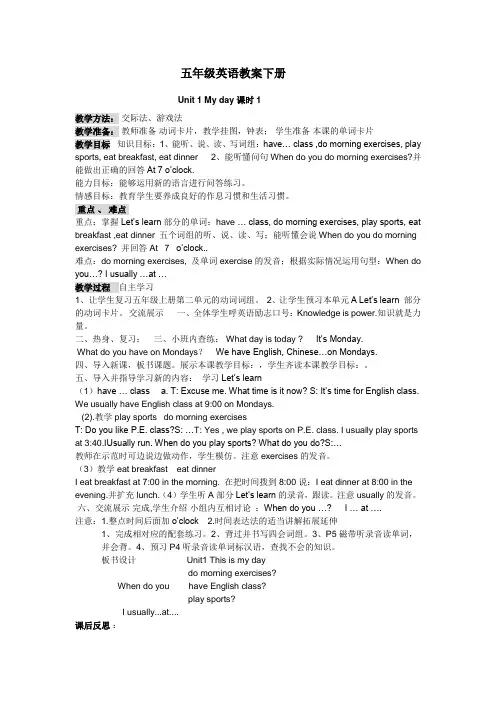
五年级英语教案下册Unit 1 My day 课时1教学方法:交际法、游戏法教学准备:教师准备动词卡片,教学挂图,钟表;学生准备本课的单词卡片教学目标知识目标:1、能听、说、读、写词组:have… class ,do morning exercises, play sports, eat breakfast, eat dinner 2、能听懂问句When do you do morning exercises?并能做出正确的回答At 7 o’clock.能力目标:能够运用新的语言进行问答练习。
情感目标:教育学生要养成良好的作息习惯和生活习惯。
重点、难点重点:掌握Let’s learn部分的单词:have … class, do morning exercises, play sports, eat breakfast ,eat dinner 五个词组的听、说、读、写;能听懂会说When do you do morning exercises? 并回答At 7 o’clock..难点:do morning exercises, 及单词exercise的发音;根据实际情况运用句型:When do you…? I usually …at …教学过程自主学习1、让学生复习五年级上册第二单元的动词词组。
2、让学生预习本单元A Let’s learn 部分的动词卡片。
交流展示一、全体学生呼英语励志口号:Knowledge is power.知识就是力量。
二、热身、复习:三、小班内查练: What day is today ? It’s Monday.What do you have on Mondays?We have English, Chinese…on Mondays.四、导入新课,板书课题。
展示本课教学目标:,学生齐读本课教学目标:。
五、导入并指导学习新的内容:学习Let’s learn(1)have … class a. T: Excuse me. What time is it now? S: It’s time for English class. We usually have English class at 9:00 on Mondays.(2).教学play sports do morning exercisesT: Do you like P.E. class?S: …T: Yes , we play sports on P.E. class. I usually play sports at 3:40.I Usually run. When do you play sports? What do you do?S:…教师在示范时可边说边做动作,学生模仿。
PEP人教版五年级英语下册全册教案Unit 1 My dayPart ALet’s try & Let’s talk【教学目标】1. 能听懂Let’s try部分的内容,并勾选出正确的图片。
2. 能听、说、认、读单词when、after、start、usually、Spain、late。
3. 能在日常口语交际中灵活运用句型“When do you...?(I/We... )At ... o’clock”。
4. 能灵活询问做某事的具体时间,并做相应的回答。
【教学重难点】重点:能认读单词when、after、start、usually、Spain、late,灵活运用句型“When do you..? At...o’clock”。
难点:能灵活运用“When do you usually eat dinner…?Usually at…o’clock.”问答作息时间。
【课前准备】1. 单词卡片;2. 教学光盘或其他录音机设备;3. 教学课件;4. 人物头饰。
【教学过程】Step 1:Warm-up(1)教师领唱歌曲“My weekend”,学生跟唱,营造英语学习氛围。
(2)教师拿出相应的单词卡片,问学生:“When do you play sports?”Ss:“At 6:00 p.m.”同桌两人一组,拿出对应的单词卡片,运用句型“When do you ... ?”“At ...a.m./ p.m.”。
Step 2:Presentation(1)设置情景教授新的单词。
教师问“在西班牙,早餐之后,通常什么时候开始英语课?”引出并教授新单词“Spain,after,when,start,usually”。
教师针对刚刚提出的问题给出回答:“10:00 a.m.”学生点评:“很晚”引出新单词“late”。
板书所有新单词并教授。
(2)情景讲解。
Zhang Peng和Pedro正在谈论Pedro在西班牙的活动作息时间,让学生听录音。
2024年人教PEP版五年级英语下册Unit 6单元教案优秀范文一、教学目标知识与技能:学生能够熟练掌握本单元的核心词汇和句型,包括日常生活中常见的购物、衣物尺寸和颜色等表达,并能够在实际情境中正确运用。
过程与方法:通过多样化的教学活动,引导学生积极参与语言实践,发展他们的听、说、读、写能力,特别是表达能力和合作学习能力。
情感态度与价值观:激发学生对英语学习的兴趣,增强他们用英语进行交流的自信,同时培养他们合作互助的精神和跨文化交流的意识。
二、教学重点和难点教学重点:本单元的重点是衣物尺寸和颜色的表达,以及购物相关的交际用语。
学生需要能够流利地表达尺寸(如:size)和颜色(如:red, blue, yellow等),并能在模拟购物情境中熟练运用。
教学难点:对于部分学生来说,准确掌握衣物尺寸的表达和在实际应用中灵活使用可能是难点。
同时,由于文化差异,学生对于某些颜色词汇的理解和应用也可能存在困难。
三、教学过程导入新课利用多媒体展示不同颜色和尺寸的衣物图片,激发学生的兴趣。
通过提问引导学生复习相关词汇,如“What color is it?” “Whatsize do you wear?”等。
简要介绍本单元的主题,并告知学习目标。
词汇学习通过实物、图片或PPT展示新词汇,确保学生直观理解。
采用配对练习、小组竞赛等方式,巩固学生对新词汇的记忆。
鼓励学生用新词汇造句,以检测他们对词汇的理解和运用能力。
句型操练教师先示范句型的使用,如“Can I help you?” “I want to buy a shirt. What size do you wear?”等。
组织学生进行角色扮演,模拟购物场景,实践句型的运用。
通过对话练习,帮助学生熟悉并掌握购物时常用的交际用语。
文化导入介绍中西方购物文化的差异,特别是在购物习惯和礼貌用语方面。
通过视频、图片等展示不同国家的购物场所,让学生感受不同的购物环境。
鼓励学生讨论并分享自己的购物经历,增强跨文化交流的能力。
人教版(PEP)小学英语五年级下册全册教案Unit 1 This is My Day第一课时一、教学目标与要求1、能够听、说、读、写以下动词短语:eat breakfast , do morning exercises , have English class , play sports , eat dinner .2、能够听懂问句:When do you do morning exercises/……并能用所学动词短语替换句型“I usually …at…”中的关键词回答问句。
3、能够理解并说唱Let’s chant 部分的歌谣。
4、能够了解Good to know 部分的内容。
二、教学重点、难点1、重点是掌握A部分中的五个动词短语,并能用这些回答询问作息时间的问题。
2、难点是exercises , ususlly 的发音。
三、课前准备1、录音机和相关的录音带2、五个动词短语的教学卡片四、教学步骤1、热身(1)对话练习:询问时间What time is it now ? It’s ……(2)复习五年级第一学期所学的一些动词,如:cook the meals , wash clothes 等。
2、新课呈现(1)游戏:Guess! What am I doing ? 引出新动词词组:do morning exercise , have English class , eat breakfast , eat dinner , play sport ?(2)利用chant 对学生进行巩固练习What can you do ? I can do morning exercises . What can you do ? I can ……(3)在黑板上画一口钟,标出时间。
教师:I do morning exercises at 7:00 . What about you ?(4)让学生根据自己的时间,对刚刚所学的动词短语进行练习。
第一课时教学重点第四、五单元中单词的熟练掌握与应用ing句型的掌握教学难点表达不同人称正在做某事的句型教学过程活动一:唱一唱教学参考时间:1-2分钟活跃课堂气氛,让学生在歌曲中重新熟悉所学句型活动二:做一做教学参考时间:2-3分钟⑴教师准备出第四、五单元中所出现的一些动词的单词卡片,让学生随意抽出任意单词,根据所看到的单词做出相应的动作,然后请其它同学用“he is……/ she is……. 说一句话。
⑵如果该同学说的句子是对的,则抽卡片的同学说: “yes, i’m ….”反之则说: “no. i’m ….”检查学生掌握、认读、理解单词的情况,让学生在活动中复习现在进行时的句子,避免枯燥性,提高学生的学习兴趣活动三:找卡片教学参考时间:2-3分钟⑴教师将第四、五单元a、b let’s learn部分的短语卡片一次放在黑板槽内,让每位同学都能看清。
⑵将学生分为每两个学生一组。
教师说一个短语,学生快速找到该卡片并读出卡片上的单词或短语。
检查学生认读单词的情况和对单词理解的情况活动四:你能做什么教学参考时间:3-4分钟⑴教师出示第四、五单元主情景图的挂图,学生轮流描述情景图里人物/动物正在做的活动。
⑵请两人一组上来看图作对话练习。
通过复习以前学过的知识,唤起学生对表示某人能力句子的记忆presentation (新课呈现)活动五:谁的眼力好教学参考时间:5分钟⑵第一遍后请同学说说看到了什么,同学之间可以互相帮助,对于说对的同学教师应及时给予表扬。
⑶第二遍后请同学互相补充第一遍没有说出或说对的句子。
⑷第三遍请每位同跟读听到的句子。
练习某人正在做某事的句子,通过这一活动的设计使每一位同学精神力高度集中,都参与到课堂教学中。
活动六:说一说、找一找教学参考时间;7-8分钟⑵学生自己读短文。
⑶教师出示本部分的挂图,请同学合上书试着看着挂图来讲解或者是复述挂图内容。
逐步培养学生良好的英语学习习惯并逐步提高对学生的要求,能够用书上的话或者是自己的话来表达故事内容,逐渐脱离课本对自己的束缚。
PEP小学英语五年级下册全册教案第一课时教学重点:Let’s learn中的动词短语:eat breakfast,do morning exercises,have English class,play sports,eat dinner。
句型:When do you do ...? I usually...at...。
教学难点:单词exercises和usually的发音较难掌握:exercises可以让学生分音节由慢到快的模仿发音;usually先让学生着重练习/V/的音,再完成整个单词的发音。
课前准备:调查表的复印材料。
动词短语eat breakfast,do morning exercises,have English class,play sports,eat dinner的图片(下面标有相应的英文)。
录音材料:Let’s start,Let’s learn,Let’s chant,五年级上册第二单元B部分歌谣。
教学过程:Warm up (热身)活动一猜时间教学参考时间:2-3分钟教师在黑板上画一个大钟表的图,不要画上时针和分针,自己站在前面,张开手臂演示一个时间,注意演示时将一直手臂缩短一些表示时针,然后提问:What time is it?引导学生用It’s...回答。
请几名同学进行演示,其他同学说出相应的时间。
Review(复习)活动二复习短语教学参考时间:5分钟教师播放五年级上册第二单元B部分歌谣课件,学生一起说唱。
教师提问:What do you do on Saturdays?引导学生说出学过的动词短语。
出示Let’s start部分插图,请学生分别说出图中示意的短语(可以不按顺序),当一名同学说到一个短语时,其他同学要指向相应的图。
教师播放Let’s start部分录音,引导学生根据听到的内容在相应的图下写出自己做这件事的时间。
引导学生理解When do you...?的意思。
五年级英语pep下册教案Chapter 1: Greetings and IntroductionsObjectives:- To greet and introduce oneself in English- To ask and answer simple questions about personal informationVocabulary:- Greetings: hello, hi, good morning, good afternoon, good evening- Introductions: My name is..., I am..., Nice to meet you.- Questions: What is your name?, How old are you?, Where are you from?Key Sentences:- A: Hello, my name is ______. B: Hi, ______. Nice to meet you.- A: How old are you? B: I am ______.- A: Where are you from? B: I am from ______.Materials:- Flashcards with greetings, introductions, and questions- Pictures of different countriesProcedure:1. Greetings and Warm-up:- Greet the students and ask how they are doing.- Review some greetings words and phrases.2. Introduce Myself:- Make a self-introduction using simple sentences and gestures.- Ask the students to guess what you are saying.- Ask individual students to introduce themselves using the same sentences.3. Introduce Each Other:- Divide the students into pairs.- Instruct them to introduce themselves to their partner.- Have pairs take turns introducing each other to the class.4. Vocabulary Introduction:- Show flashcards of greetings, introductions, and questions.- Drill the vocabulary with the class by saying the words and having them repeat.5. Role Play:- Assign pairs of students different roles, such as A and B.- A starts the conversation by greeting and introducing themselves.- B responds and asks questions about A's personal information.- Encourage the students to ask follow-up questions.- Switch roles and let B take the lead.6. Cultural Exploration:- Show pictures of different countries.- Ask students where they think the pictures were taken.- Introduce the concept of different countries and nationalities.7. Wrap up:- Recap the key vocabulary and sentences.- Ask individual students to demonstrate their understanding by using the vocabulary and sentences.Extension:- Encourage students to create a small skit or dialogue using the vocabulary and sentences learned.。
新版PEP英语五年级下册教案dayPeriod1Section A Let’s learn Ask and write P5教师寄语:(Always do your best、凡事都要尽力去做、)Learning aims(学习目标)1、能听、说、读、写do morning exercises, eat breakfast, have…class, play sports, eat dinner。
2、会说句型:“When do you do morningexercises/…?”并能回答“At…o’clock、”。
Important&difficult points(重难点)1、掌握Let’s learn中的动词短语并能用于回答问询作息时间。
2、掌握单词exercises的正确发音。
导学探究Step1 : 预习温故(用时5分钟)1)T: Hello , boys and girls! Welcome back to school! Ss: Hello, Miss、、、、 Nice to see you again、 T: Nice to see you ,too、2)T: What time is it? (可以课前在黑板上画一个钟面,张开手臂演示一个时间)Ss:It’s9/10/11 o’clock、(注意给学生强调整点时间后面要用o’clock)反复操练。
3)Go over these phrases : wash my clothes, watch TV, do homework, read books, play football、Let’s do homework/read books/playfootball/… 、 I often wash my clothes/watch TV/do homework/ read books/… 、Step2、新课内容展示(用时20分钟)。
1、Use the cards to learn new phrases、T: do morning exercises, do morning exercises, follow me to read、用同样的方式教读其他词组:eat breakfast, have…class, play sports, eat dinne(重点强调exercises、breakfast的发音)。
2、 T: do morning exercises, do morning exercises, Let’s/I often do morning exercises、T: eat dinner, eat dinner Let’s/ I often eat dinner、3、 Read these sentences、T: I can swim/play football/play sports…、、T: Can you do morning exercises/…? Ss: Yes, I can、/No, I can’t、T: When do you do morning exercises /play football/play sports?” Ss: At… o’clock、(跟学生强调整点前要用介词at)反复操练。
4、学生听录音,分角色读Let’s learn 。
Step3、合作交流,师生共建(用时8分钟)新课标第一网Role- play:1)Answers the questions、T: What time is it? Ss: It’s six/nine o’clock、T: I get up at six o’clock、 When do you get up/go to school? Ss: I get up at7、a、m/7:30、2)Ask and write、教师引导学生完成填空,并分小组运用句型进行对话练习:T: When do you get up/do morning exercises? Ss: I get up at…、a、m/p、m、反思:在今后的每一节课都要灵活运用所学句型,请学生造句,要具有培养学生的创新意识。
Step4、达标检测(用时6分钟)一、看图片选短语,并译成汉语。
A、 do morning exercises ()B、 eat breakfast ()C、 have English class ()D、 play sports()E、 eat dinner ()1、_____2、_____3、_____4、_____二、选词填空,并读一读。
sports, exercises , have English class , breakfast , dinner1、When do you _________________(上英语课)?2、 I play _______(进行体育运动)at6 o’clock 、3、 We eat ________(吃早饭)at7 o’clock a 、 m 、4、 When do you do morning __________(早锻炼) ?5、Let’s eat ______(吃晚饭) together 、三、选一选,读一读。
()1、你们常常三点钟上英语课吗?A、Let’s eat breakfast、()2、我通常六点钟进行体育运动。
B 、 When do you do morning exercises?()3、我们一起吃早饭吧。
C 、 Usually I play sportsat6o’clock、()4、你什么时候早锻炼?D、We eat dinner at8 o’clock p、m、()5、我们晚上八点吃晚饭。
E 、 Do you often have English classat3 o’clock?学生小结:这节课我学到了_________________________________Step5、布置当堂作业http:1、书写并背诵四会词组。
2、读背Let’s learn的对话。
板书标题 Unit1 My day 板书内容设计:do morning exercises eat breakfast have…class play sports eat dinner When do you do morningexercises/eat breakfast/…? At…o’clock、When do you get up/…? I get up at…、a、m/ p、m、教学反思:Period2 Section Alets try lets talk P4Learning aims(学习目标)1、能听懂Let’s try部分的内容,并勾选出正确的图片。
2、听、读Let’s talk部分,运用核心句子“When do you finish your class in the morning?”“We finish class at1 o’clock、”来谈论时间,并变换单词,分角色练习对话。
Important &difficult points(重难点)1、掌握句型“When do you finis h your class in the morning?”并能做出正确回答。
2、能灵活运用“When do you usually eatdinner/…”“Usually at…o’clock、”问答作息时间。
导学探究Step1 : 预习温故(用时6分钟)1、Review “Times”(板书时间,让学生用英语说一说):10:00/6:00/9:00/…2、 Review the phrases、do morning exercises _____ do you get up?(A、 WhenB、 What)Let’s clean my room、学生跟读用同样的方法教读词组。
T: Do you usually clean your room/… on Saturdays? Ss: Yes,I usually clean my room/… on Saturdays、2、 Learn the new sentence: I usually clean myroom/… on Saturdays、运用新学词组反复操练此句型,再将usually换成often: I often clean my room/… on Saturdays、反复操练该句型,让学生掌握。
3、 Listen to the tape and read it again、Step3、合作交流,师生共建(用时8分钟)1、Substitution drills:用always /sometimes替换often 进行句型练习。
2、Listen and read“Let’s learn”、3、 Do a survey:T: What do you do on Saturdays /on Sundays /on the we ekend? Ss: I often/always/sometimes go shopping /… with my mother/…on Saturdays/on Sundays/on the weekend、反复操练。
Step4、达标检测(用时6分钟)一、选择正确的词组,并读一读、译一译。
A、 go for a walk()B、 take a dancing class ()C、 clean my room ()D、 go shopping()1、_______2、_______3、________4、_______二、为下列句子选择相应的答语。
()1、When do you go to bed?()2、 When do you eat breakfast?()3、 What do you do?()4、 What do you do on the weekend?A、 At7:oo a、m、B、 I Often read books、C、 At9:00 in the evening、D、I’m a student、三、选出翻译正确的一项。
新课标第一网1、When do you finish class in the morning?A、你们早上什么时间上课?B、你们早上什么时间放学?2、 When do you go back to school after lunch?A、你午餐后什么时间回学校?B、你午餐后什么时间离开学校?3、 I often go shopping with my father on the weekend、A、周末我通常跟我爸爸一起去购物。